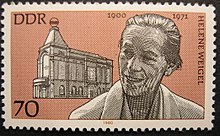Helene Weigel
Helene Weigel | |
|---|---|
 Weigel in 1967, as "Mother" in Bertolt Brecht's play The Mother | |
| Born | Helene Weigel 12 May 1900 |
| Died | 6 May 1971 (aged 70) |
| Occupations |
|
| Spouse | Bertolt Brecht |
| Children | 2 |

Helene Weigel (German: [heˈleː.nə ˈvaɪ̯gl̩] ; 12 May 1900 – 6 May 1971)[1] was a German actress and artistic director.[2] She was the second wife of Bertolt Brecht and was married to him from 1930 until his death in 1956. Together they had two children.
Personal life
[edit]Weigel was born in Vienna, Austria-Hungary, the daughter of Leopoldine (née Pollak) and Siegfried Weigel, an accountant-general in a textile factory.[1] Her family was Jewish.[1] She and husband Brecht had two children, Stefan Brecht and Barbara Brecht-Schall. Weigel was a Communist Party member from 1930.[1]
Career
[edit]Weigel became the artistic director of the Berliner Ensemble on 16 February 1949.[citation needed] She is best remembered for creating several Brecht roles, including: Pelagea Vlassova, The Mother of 1932; Antigone in Brecht's version of the Greek tragedy; the title role in his civil war play, Señora Carrar's Rifles; and the iconic Mother Courage.[citation needed]
Between 1933 and 1947, as a refugee from Adolf Hitler's Germany, she was seldom able to pursue her acting craft, even during the family's six-year period in Los Angeles.[citation needed] It was only with the foundation of the Berliner Ensemble in East Germany in 1949 that Brecht's theatre began to be recognized worldwide.[citation needed] She died in 1971, still at the helm of the company, and many of the roles that she created with Brecht are still in the theatre's repertoire today.[citation needed]
Death
[edit]Weigel died in East Berlin on 6 May 1971, six days before her 71st birthday.[1]
Notable understudies
[edit]- Ingrid Pitt, British-Polish actress
References
[edit]- ^ a b c d e "Helene Weigel | Jewish Women's Archive". Jwa.org. Retrieved 1 January 2013.
- ^ "Helene Weigel". BFI. Archived from the original on 11 April 2020.
External links
[edit]- Berliner Ensemble
- Jennifer Marston Willia, Biography of Helene Weigel, Jewish Women Encyclopedia
- Helene Weigel at IMDb
| International | |
|---|---|
| National | |
| Academics | |
| Artists | |
| People | |
| Other | |
Text is available under the CC BY-SA 4.0 license; additional terms may apply.
Images, videos and audio are available under their respective licenses.
